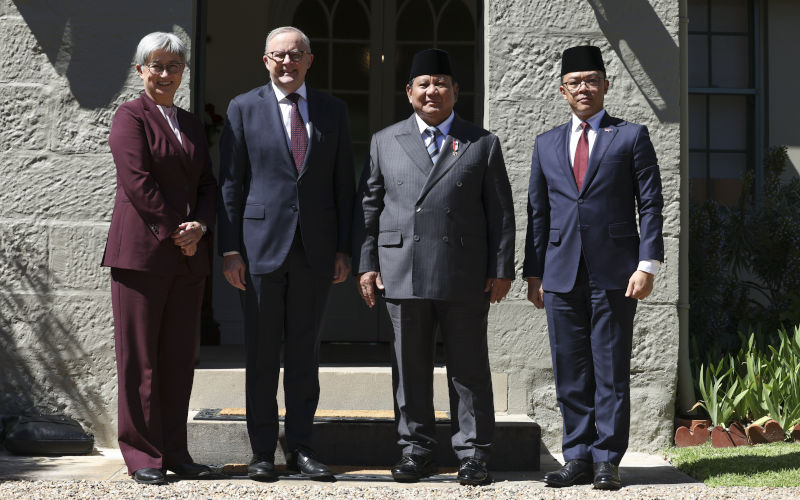Trick or treaty? Don't know, can't say
November 15, 2025
The Indonesian print media covering the one-day visit of President Prabowo Subianto to Australia this month has dazzled its readers with some splendid insights into a serious issue.
Here’s a couple from the nation’s leading broadsheet, Kompas:
“According to Prabowo, Indonesia and Australia are destined to live side by side as neighbours who respect and help each other, especially when facing common challenges.”
Then this comment to Prime Minister Anthony Albanese:
“I think your intelligence is excellent. You know I love bagpipes. So, I was welcomed with bagpipes. Thank you very much. Hearing this, Australian PM Anthony Albanese seemed to laugh.”
The headline was Ngakak! (Hilarious) suggesting the writer has a toddler’s sense of humour, or is trying to butter up the notoriously irascible president. Like Trump, he’s prone to blackball journalists he doesn’t like. Free-for-all media conferences are now rare.
The Indonesian press was once as robust as Australia’s. Frank reporting late last century on the crumbling Orde Baru (New Order) government of former general Soeharto by the weekly Tempo, modelled on the US magazine Time and the English language Jakarta Post, helped destroy 32 years of corruption and kleptocracy and reintroduce democracy.
Those were the media’s golden years. They are now tarnished, as the anodyne quotes above show. The Indonesian reporters were supposed to tell their readers why Prabowo went Down Under to sign a “security treaty”.
It was modelled on one written in 1995 by his late father-in-law and the then Australian prime minister Paul Keating.
The document didn't last. It was trashed when Indonesian troops entered the largely Catholic East Timor after the population had voted 80-20 in favour of an independent Republic, rejecting Jakarta’s offer to join the big neighbour.
Commented Professor Greg Barton, chair in Global Islamic Politics at Deakin University:
“Even in the dark months that followed, when Australian troops landed in East Timor to lead a peacekeeping mission, conflict between Australia and Indonesia was avoided. This was in no small measure because of the personal relationships and level of trust between the individual commanders on the ground.”
This interpretation needs to be challenged. The Indonesian military reportedly recruited and paid 3000 pro-Indonesian militia to do their killing and looting, so it seemed that Jakarta had clean hands.
The US-based human rights activist NGO Centre for Justice and Accountability reported: “Between 1975 and 1999, some 200,000 Timorese were killed by Indonesian occupation forces who used starvation and sexual violence alongside chemical weapons and napalm.
“In 1999, a long-awaited independence referendum brought renewed violence, as Indonesian military and paramilitary reprisals killed over 2000 Timorese and decimated 75% of the country’s infrastructure. Some 240,000 people — one third of the population — fled their homes and were forcibly relocated to the Indonesian province of West Timor.”
The Indonesian NGO Human Rights Watch claimed the militia Besi Merah Putih (Iron Rod for the Red-and-White Indonesian flag) was “responsible for the carnage in Liquica (a coastal city 30 km west of the capital Dili)…in which dozens of people, many of them displaced people fleeing from violence, were killed in a church compound”.
Whatever the wording of the “security treaty” is when the final version is due to be signed early next year, it’s unlikely to lead to Australian co-operation with a military retaining a scorched-earth culture and hiring thugs to deal with dissidents.
Keating met Prabowo during his Australian stopover – an event recorded by the president’s travelling PR team. They reported that a “warm and cordial atmosphere prevailed (at Kirribilli House), reflecting the close personal relationship between the two leaders”.
“Following the reception, President Prabowo signed the state guest book as a sign of diplomatic respect.” Missing are details of the spoonfuls of sugar used in Prabowo’s tea.
For 30 years we’ve done without a “security treaty”. Seeking an excuse for a hi and goodbye splash of laid-back Oz-pomp, it’s now being revived.
The location was the docked chopper carrier Canberra, the flagship of the Australian Navy, where Prabowo felt at home among men and a few women in uniform watching history being made.
Was it? There are doubts, because the public doesn’t know what’s in the document or what it should be called. Prabowo was reported saying it was an “agreement”, a “new milestone” (though both nations use metric measurements) and then a “treaty”.
The words here are important because Indonesia’s “non-aligned policy”, now almost 80 years old, prohibits pacts with other powers. It’s a leftover from the days when the US and Russia were competing for influence.
If Australians think they’ve got a deal with their neighbour that the document will trigger a joint response, should one or the other hit strife from outside (read China), then they haven’t read the small print.
This is no NATO-style pact where an assault on one means an attack on all.
Australian Foreign Minister Penny Wong said the two leaders agreed to “undertake to consult at Leader and Ministerial level regularly about matters affecting their common security”.
“(Also) to undertake to consult each other in the case of adverse challenges to either party or to their common security interests… and, if appropriate, consider measures which might be taken either individually or jointly and in accordance with the processes of each party”.
In plain English, if there’s a problem, let’s talk.
Should any conflict arise that might warrant visiting the treaty, it will be up to interpretation by whoever is a leader. The language is as rubbery as any bureaucrat would desire, making the whole episode more soft PR than hard policy.
Perhaps the Indonesian journos are better than their Oz counterparts at making something out of nothing. At least they reported the bagpipes.
The views expressed in this article may or may not reflect those of Pearls and Irritations.


